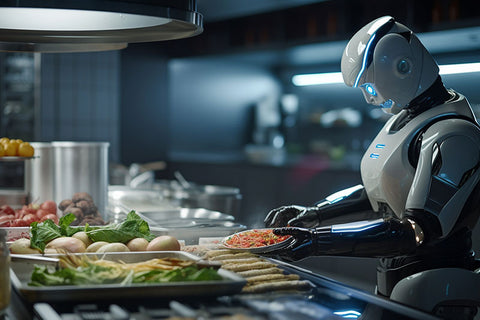What will the food of the future be like? Horizon 2073
A tiny dehydrated pizza that became a familiar one after a few seconds of preparation. So Marty McFly envisioned that it would be the food of the future in 2015, in the legendary film 'Back to the Future II', from 1989. And now? What does the gastronomic horizon hold for us in the next 50 years?
What will the food of the future be like?
In a world in constant evolution, the food of the future is seen as a space for innovation and change. Now, today, thanks to Big Data, we no longer depend only on imagination to know what the food of the future will be. So, Euromonitor, through data analysis, has outlined the culinary trends that will prevail in 2073. And as you might guess, technology, sustainability and consumer preferences will shape the way we eat in the coming decades. These are the main keys.
Personalized diets
The technology will allow a even greater diet customization. Keep in mind that digital devices allow access to a large amount of information about each person's consumption habits. In this way, the menus can be customized on the fly. And it's not just about being able to choose the type of garnish or the point of the meat, but you can also get foods based on your genetics and your health.. This will lead to increased demand for food products tailored to specific needs, such as diets to manage medical conditions or food preferences.
Technology in the supply chain
At the production level, blockchain technology and other digital solutions will transform the food supply chain, improving traceability, transparency and food safety. That is, as a consumer you can access detailed information about the origin and quality of products, which will increase confidence in the food they consume. In fact, QR codes and NFT tags will become as inherent to gastronomy as the cutlery themselves, providing exhaustive information about each product.

Digitized delivery
Technological transformation will also affect the way food is delivered in the future. This means that Drones will be the new 'riders' in the next half century, sharing space with extraordinary vending machines, capable of preparing an 'a la carte' menu and ready to pick up and taste. In this sense, we will also assist the rise of the 'ghost kitchen', that is, restaurants in charge of preparing food, but without offering dining room service. Of course, Robots will also be integrated as new workers within the staff of restaurant companies.

Premiumization of the food of the future
Does this mean the end of restaurants as we know them? At all. People will continue to enjoy gastronomy in local restaurants as a moment of leisure and social interaction. Yes indeed, These meetings will become authentic culinary experiences, where innovation and quality will prevail to provide added value to the food of the future.
What is going to be the food of the future?
Concern for the environment will drive the adoption of more sustainable food practices. Did you know that, according to the magazine Nature, the food sector accounts for up to 35% of total greenhouse gas emissions? Before this environmental impact, consumers will look for options that minimize their carbon footprint and promote the health of the planet. Therefore, Reducing food waste, promoting regenerative and ecological agriculture and increasing the consumption of plant-based foods will shape the food of the future.
Furthermore, the greater concern for the health of citizens will drive the demand for functional foods that offer additional benefits beyond basic nutrition. Products enriched with probiotics, new sources of proteins or the so-called superfoods will gain popularity due to their positive effects on the well-being of the population.
In this sense, Extra virgin olive oil will continue to be part of the food of the future due to its health properties. Of course, quality EVOO grown under sustainability standards will reign. Do you want to be ahead of your time? Te invitamos a probar los aceites de oliva virgen extra de Hacienda Guzmán, extraídos de nuestras 340 hectáreas de olivar ecológico certificado con un cuidado tratamiento a lo largo de todo el proceso. Try them!






